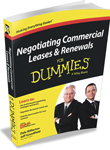 By Jeff Grandfield and Dale Willerton – The Lease Coach
By Jeff Grandfield and Dale Willerton – The Lease Coach
How much do you know about your own commercial landlord? There is a strong likelihood that you will lease commercial space for your business but not, however, know all the facts about whom you choose to do business with. Commercial landlords fall into different categories and have different motivations for owning their commercial real estate development. To independent retail entrepreneurs, being a landlord looks easy — landlords take care of the property and collect the rent. However, landlords can become casualties of the economy and even victims themselves when their tenants can’t pay their rent or completely go out of business.
We have defined the most common types of landlords in our book, Negotiating Commercial Leases & Renewals FOR DUMMIES, and summarized them below. A professional landlord isn’t a person, but a company that exists for the sole purpose of owning, developing, leasing, buying, and selling commercial, residential, and industrial property for a profit. A professional landlord may not only own various real estate assets but also internally manage those properties. Furthermore, a professional landlord uses various commercial real estate formulas to calculate and measure the rate of return on their properties. When you’re negotiating a commercial lease or renewal, the leasing representative punches the numbers into a calculator and gives the landlord a net effective rental rate — determining if the deal is advantageous or not for the landlord.
Two examples of institutional landlords include banks and insurance companies. One of the safest places for institutional landlords to invest your deposits, and their profits, is in commercial real estate. An institutional landlord can generally afford to leave a property vacant rather than take a low rent deal from a tenant. Cash flow is important to institutional landlords, but property value is paramount. In some cases, a landlord may have started out as the mortgage holder for a commercial property which eventually went into foreclosure. In this circumstance, the bank’s property ownership may be more by accident than desire.
Investment fund landlords can include teachers, nurses, and other professional associations who invest pension fund money to buy and hold commercial real estate. Investment fund landlords rarely construct new buildings; instead, they make a purchase decision on a commercial property based on the existing or predictable rate of return. Their decision to purchase real estate hinges on security and safety.
Commercial developers are individuals who pool their financial resources to purchase a parcel of land. They then create design specifications and property site plans to maximize their return on investment. Developers want to have the highest number of rentable square feet on their properties so as to maximize the return.
A Commercial Flipper is a developer who sells the property quickly in hopes of a fast profit. This isn’t necessarily a derogatory term. From a tenant’s perspective, it’s important to distinguish if the developer is a flipper. If so, you can bet that within a year or so you’ll have a new landlord who is more a long-term investor. Finding land, designing good properties, pre-leasing, and finishing the projects requires hard work. It can be much easier for a landlord to purchase flipped properties.
A Casual Landlord typically has a few holdings and may be casual towards their investment and their tenants. They’re often slow to respond and almost never proactive during the leasing process. Their investment is simply not a priority to them and, as a result, good tenants get neglected.
Mom and Pop Landlords are commonly wealthy doctors, architects, or families who have accumulated some real estate or have an accumulated wealth invested in real estate. Typically, they’re hands-on with the property and often quite accessible to tenants on a personal basis. Mom and Pop landlords typically want low-maintenance tenants who pay their rent promptly and don’t call them at midnight to report a problem with the property. The longer they have owned the property, the more emotionally invested in the property they become. For some smaller landlords, they may be more negotiable on rental rates rather than providing months of free rent or large tenant allowances as they may not have a pool of capital to draw from.
Understanding the different types of landlords can have a direct impact on your business. Now that you know, how would you categorize your own commercial landlord?
